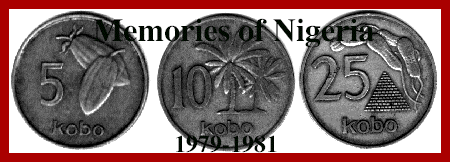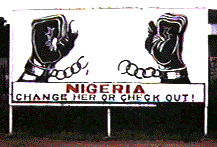Grose Educational Media's


This was the trail from the village of Ujoelen to the market in Eguare,
Ekpoma.
The road was widened and paved prior to the burial of Chief
S.O. Alli,
Ezomo of Ekpoma, in October of 1980. His son, Professor Ambrose F. Alli
was Governor of Bendel State at the time of his father's death and burial.

Ujoelen Grammar School, Ekpoma in 1980
The following were the comments I made near the end of my two year posting
there:
Ujoelen Grammar School
P.O. Box 24, Ekpoma
Bendel State, Nigeria
January 28, 1981
Ujoelen Grammar School was founded in 1960. It is a boys' school with a
student population of about 1,000. At present, about 19% of the students
are boarders however the residential system is being phased out. There are
forty teachers on staff but a quarter of them are students doing teaching
practice. Eight teachers, including the principal, are university graduates.
Three of these are expatriates (an Indian couple and the CUSO). Another
five teachers have the National Certificate of Education (one of them is
a member of the National Youth Service Corps). Although the school is relatively
well staffed, the turnover is high: in the past year the school lost four
graduates when they became functioning principals in new schools. Three
other senior masters went to England to obtain degrees and at least six
others went for further training at various institutions in Nigeria. I have
no doubt that the services of one or more CUSO's would be appreciated.
The school is located in the village of Ujoelen, about three kilometres
from the town of Ekpoma which is the headquarters of Okpebho local Government
Area. Actually Ekpoma is a group of villages. The area referred to as the
town, where the market, Post Office, churches, and a branch of the First
Bank (formerly Standard Bank) are found, is Eguare -- the home of the Onogie
(a sort of senior chief),
A large market is held every fourth day and there is a smaller market every
second day. Beef, goat, bush meat, fish, onions, tomatoes, rice, yam, gari,
plantain, groundnuts, bread, biscuits, sugar cubes, green leaves (similar
to spinach), and a limited selection of canned goods (mackerel, sardines,
corned beef, tomato paste, oatmeal, margarine, etc.) are available. One
can enjoy oranges, tangerines, grape fruit, pawpaw, pineapples, coconuts,
and mangoes when they are in season; powdered milk, ovaltine, coffee, and
tea are also sold in the market but they are much cheaper in Uromi (25 kilometres
to the east, where the nearest branch of the Union Bank is located) or Benin
City, 83 kilometres south of here via a good two-lane highway). Macaroni
products and other "European" foods are not found in Ekpoma and
they are usually less expensive in Benin City than in Uromi. Eggs can be
purchased from the school farm.
There are two halves of a double house in the compound to accommodate CUSO's.
Each half of the house consists of two bedrooms and a sitting room with
a shower room, toilet, and kitchen in a separate section behind the living
area. There has not been any running water since October 1979 but the house
has a five hundred gallon water tank which is filled by a tanker during
the dry season.
In preparation for the burial of the state governor's father in October
1980, Ekpoma was connected to the National Electric Power Authority. Since
then we have had a fairly constant supply of electricity (the infamous NEPA
functions about 70% of the time) -- of course, this is no guarantee for
the future. The house has a large compound surrounded by a zinc fence which
gives the occupant a good area for gardening.
There are no disco's in Ujoelen. Last weekend, the public address system
that was being used by some evangelists thwarted my efforts to listen to
the B.B.C, in my parlour but, usually, the place is fairly quiet. (One soon
learns to ignore roosters, goats, children, and the occasional lorry.) However,
there is no need to be bored; the students are very enthusiastic about extracurricular
activities such as participating in the Press Club and the Literary, Debating,
and Dramatic Society. For those with athletic inclinations there is a large
sports field, basketball, tennis, badminton, and volleyball courts and a
pingpong table. There is plenty to do if you still have the energy after
teaching and marking books.
The opening assembly is held at 7:45 and the school normally closes at 1:30.
There is a half hour break at 10:40. An average teaching load is about twenty
periods of thirty-five or forty minutes per week. The regular routine is
sometimes interrupted when students are called out to do labour (such as
cutting the grass) or to make preparations for the annual inter-house athletics
competition or Founders' Day festivities. The school year is divided into
three terms (approximately thirteen weeks long), with several weeks off
at Christmas and Easter, long weekends at mid-term, some Moslem holidays,
and a few other public holidays (such as National Day - October 1st).
A teacher often feels the need for a vacation but all these breaks can be
frustrating interruptions when there is so much work to be done. Most classes
have between forty-five and fifty students, many of whom cannot write a
coherent sentence by the time they reach Class IV. The pass rate in English
Language in the West African School Certificate examination is only 37%.
Many students become discouraged and this results in truancy and indiscipline.
These are common problems and they are probably less serious in this school
than in most others because of the dedication of the principal, Mr. Ifediora.
At times,a teacher's efforts seem futile and unappreciated (that is probably
true anywhere), but that is not usually the cases if you put up a poster,
play, a cassette, or work a little drama into your lesson, the students
respond with enthusiasm although some will remain suspicious until you explain
how this is connected to the West African Examination Council syllabus.
Teaching here, despite its difficulties, can be fun.
On the basis of my useful and generally pleasant experiences here I would
rate Ujoelen Grammar School as a very good post; I hope that I will be replaced
and that my successor or successors will enjoy working here as much as I
have.
Derrick Grose

Nigerian students as portrayed in a 1979 stamp
marking the International Year of the Child
For a wonderful account of a precocious boy's view of school life in the colonial era read Wole Soyinka's Aké. It provides a vivid description of many aspects of school life including dining hall oratory and justice, cutting the grass, corporal punishment, the politics of school uniforms and shoes, the clash between traditional ways and innovation and the sacrifices made by market women to provide an education for their children when mere survival was a struggle. The autobiography highlights the interaction between the Christianity and traditional beliefs in Yorubaland. This personal story converges with the history of Nigeria as the quest for independence gains momentum through the late 1930's and the 1940's.
 A map
and links to Nigeria:
A map
and links to Nigeria:
"In his journeys Dad found that all nations are children; it shocked
him that
ours too was an abiku nation, a spirit-child nation, one that keeps being
reborn
and after each birth come blood and betrayals, and the child of our will
refuses
to stay till we have made propitious sacrifice and displayed our serious
intent
to bear the weight of a unique destiny." - Ben
Okri, The Famished Road
Read a review of The Black Man's Burden, Basil Davidson's mildly optimistic history of post-colonial Africa.
Purchase The Fortunes of Wangrin, Amadou Hampate Ba's account of the rise and fall
of an exceptional African who loses touch with his roots in colonial French West Africa.
General Information
on Nigeria
Information
in Chinua Achebe's Things Fall Apart
More memories of Nigeria
Travel to other interesting places on the web
. . .
Return to the Grose Educational Media home page.
© Grose Educational Media, 1996 - 2017




 A map
and links to Nigeria:
A map
and links to Nigeria: